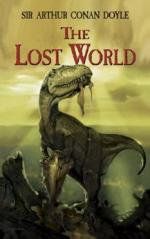We were too astounded to speak. We could only stand there staring in amazement. A great broken bough upon the grass showed whence he had gained his leverage to tilt over our bridge. The face had vanished, but presently it was up again, more frantic than before.
“We nearly killed you with a stone at the cave,” he cried; “but this is better. It is slower and more terrible. Your bones will whiten up there, and none will know where you lie or come to cover them. As you lie dying, think of Lopez, whom you shot five years ago on the Putomayo River. I am his brother, and, come what will I will die happy now, for his memory has been avenged.” A furious hand was shaken at us, and then all was quiet.
Had the half-breed simply wrought his vengeance and then escaped, all might have been well with him. It was that foolish, irresistible Latin impulse to be dramatic which brought his own downfall. Roxton, the man who had earned himself the name of the Flail of the Lord through three countries, was not one who could be safely taunted. The half-breed was descending on the farther side of the pinnacle; but before he could reach the ground Lord John had run along the edge of the plateau and gained a point from which he could see his man. There was a single crack of his rifle, and, though we saw nothing, we heard the scream and then the distant thud of the falling body. Roxton came back to us with a face of granite.
“I have been a blind simpleton,” said he, bitterly, “It’s my folly that has brought you all into this trouble. I should have remembered that these people have long memories for blood-feuds, and have been more upon my guard.”
“What about the other one? It took two of them to lever that tree over the edge.”
“I could have shot him, but I let him go. He may have had no part in it. Perhaps it would have been better if I had killed him, for he must, as you say, have lent a hand.”
Now that we had the clue to his action, each of us could cast back and remember some sinister act upon the part of the half-breed—his constant desire to know our plans, his arrest outside our tent when he was over-hearing them, the furtive looks of hatred which from time to time one or other of us had surprised. We were still discussing it, endeavoring to adjust our minds to these new conditions, when a singular scene in the plain below arrested our attention.
A man in white clothes, who could only be the surviving half-breed, was running as one does run when Death is the pacemaker. Behind him, only a few yards in his rear, bounded the huge ebony figure of Zambo, our devoted negro. Even as we looked, he sprang upon the back of the fugitive and flung his arms round his neck. They rolled on the ground together. An instant afterwards Zambo rose, looked at the prostrate man, and then, waving his hand joyously to us, came running in our direction. The white figure lay motionless in the middle of the great plain.




